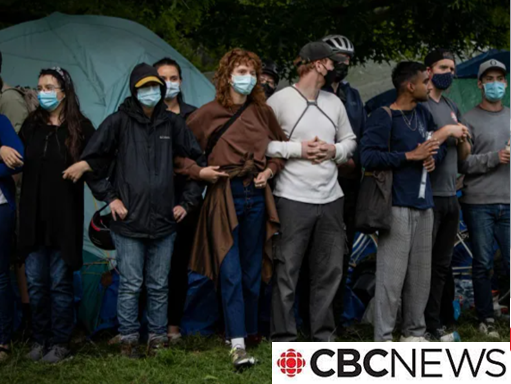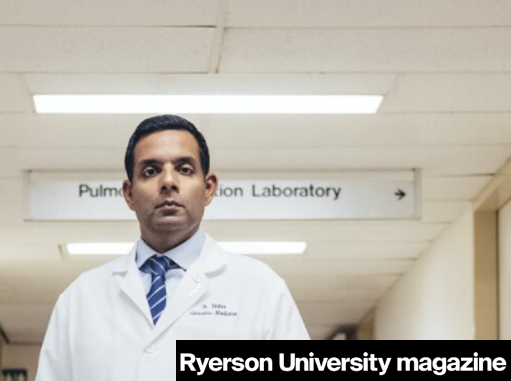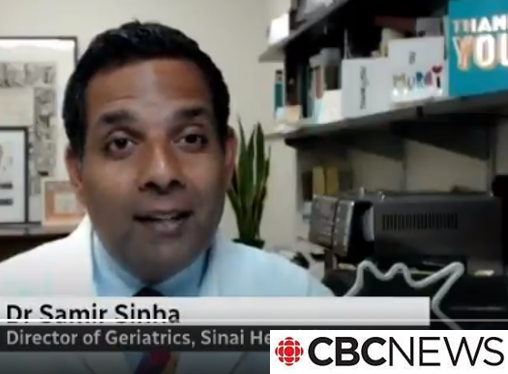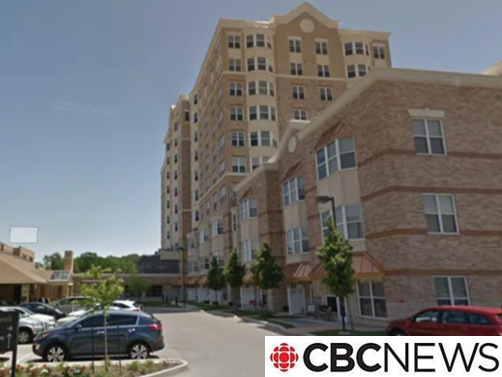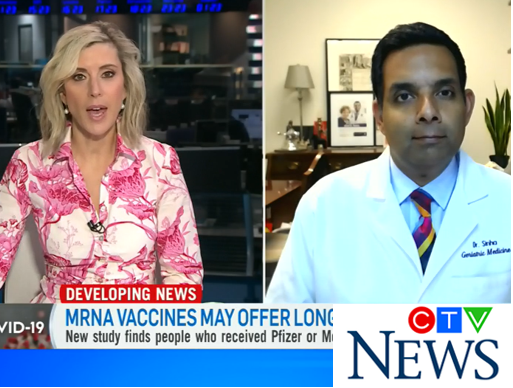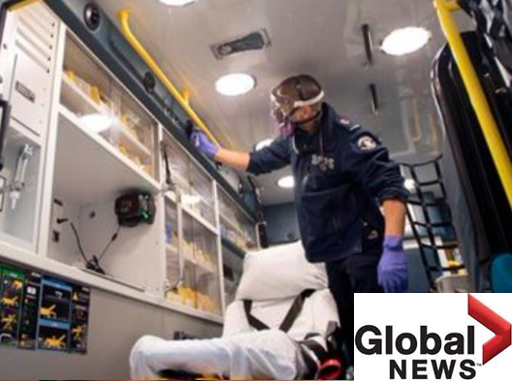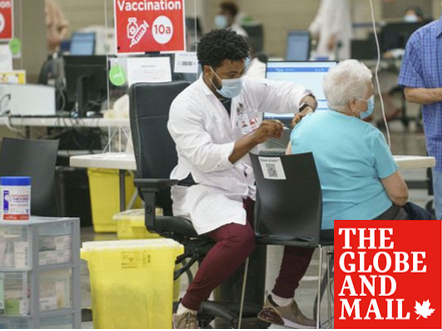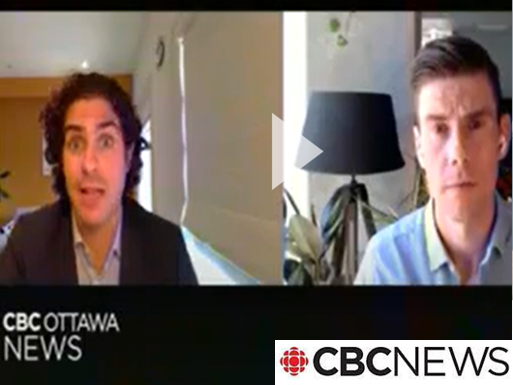Canada's Taking It Slow On Reopening Its Border To Travelers From The U.S. Here's Why
By: Emma Jacobs
Prime Minister Justin Trudeau indicated last week that vaccinated travelers will be admitted before those who are not vaccinated, but the government has said a full reopening could require 75% of Canadians — or more than 85% of the eligible population — to be fully vaccinated.
"The goal that has been set is extremely high," says Nathan Stall, NIA Associate Fellow and Geriatrician at Mount Sinai Hospital in Toronto. "We hope we get there, but we may never actually get there."
Advocates pen letter to Mayor Tory, urging him to find 'a better way' to deal with unhoused people
By: Muriel Draaisma
Homeless advocates are calling on Mayor John Tory to end the use of force against encampments in city parks and to adopt a more compassionate approach when dealing with unhoused people in Toronto.
Those who have signed the letter include more than 60 organizations. Physicians, including Dr. Andrew Boozary, Dr. Adriana Di Stefano, Dr. Naheed Dosani and Dr. Nathan Stall (NIA Associate Fellow), have also signed the letter.
National Institute on Ageing Launches Free Online Calculator to Assess People’s COVID-19 Risk When Gathering with Others
As Canada takes steps to safely reopen, a new online tool developed by Ryerson University’s National Institute on Ageing (NIA) at the Ted Rogers School of Management can help individuals and families to quickly assess their risk of getting COVID-19 when meeting or gathering with others.
Family demands changes to nursing home regulations after senior served 'eviction notice'
By: Harry Forestell
Pauline Breen, 83, was given 15 days to find new accommodation after her family questioned treatment.
"I've never heard that in all my years of practice in Ontario or anywhere else in Canada," said Dr. Samir Sinha, NIA Director of Health Policy Research. "The fear that if you are the squeaky wheel, for example, that you are going to suffer the consequences by getting worse care or be asked to leave." says Sinha.
Hurdles to pulling seniors out of long-term care during pandemic
Many Canadians have pulled their loved ones out of long-term care homes due to the pandemic’s devastating impact on those facilities. But what if those seniors need to return to nursing homes? As Mike Drolet explains, there can be complications.
Our senior citizens deserve better care
By: Mary Teresa Bitti
Dr. Samir Sinha, NIA Director of Policy Research and leader in geriatric care, recommends better staffing, upgraded facilities and a comprehensive inspections and compliance process to improve long-term care in Canada.
"We could still go a bit further": Ontario long-term care homes see loosened restrictions starting today
"Not a lot of people understood how poorly funded and supported our LTC system was, and I think a lot of Canadians have now had to face that. Now that people are well aware, it's hard for people to look away" said Dr. Samir Sinha, NIA Director of Health Policy Research on The Morning Show with Greg Brady.
Choosing care at home instead of a care home: B.C. senior opts to move in with family
"A lot of people have lost faith in our LTC system and its ability to keep people safe, especially during a pandemic. I have heard stories from many families who pulled their loved ones out of care," NIA Director of Health Policy Research, Dr. Samir Sinha.
Three LTC residents on Ontario have died in recent weeks connected to COVID-19
"We know that in homes where we don't have robust staff vaccination rates, that is always going to put residents at increased risk of experiencing outbreak. But the good news is, with the delta variant, the existing vaccines are incredibly effective," NIA Director of Health Policy Research, Dr. Samir Sinha.
Resident dies from COVID-19 at Burlington's Tansley Woods LTC home
The death of a person living at a Burlington long-term care home facing an outbreak of COVID-19's Delta variant is leading to questions about the facility's staff vaccination rate.
Dr. Samir Sinha, director of geriatrics at Toronto's Sinai Health, says the fact that most residents have mild symptoms shows the efficacy of the vaccines, even against Delta. "COVID-19 vaccines do not guarantee someone will not get infected," but they greatly reduce the likelihood of serious illness or death, he told CBC Toronto on Tuesday.
Air conditioning in long-term care
In May, the Minister of Long-term Care said at least 83% of long-term care homes will have full air conditioning by the summer. But according to a spokesperson within the long-term care Ministry, the target deadline is now the end of summer. Geriatrician and NIA Associate Fellow Nathan Stall says that's problematic. "The lack of clarity around the timeline is not particularly helpful" says Stall.
By the numbers: A look at COVID-19 in First Nations communities in western Canada
By: Dayne Patterson
Many First Nations across the country used checkpoints and lockdowns to keep the novel coronavirus out of their communities as cases spiked elsewhere. “In other Canadians, COVID has affected older populations and we have much younger populations with fewer older people—and also our infections have tended to be in younger people who experience mild illness, compared to other Canadians,” Adams said.
In Manitoba, deaths in long-term care homes make up more than 40 per cent of Manitoba’s COVID-19 fatalities, according to government data and long-term care data from the National Institute on Ageing which has been tracking COVID-19 in care homes.
Vaccinating homebound individuals to address remaining vaccine gap
Nearly 80% of adults in Toronto have received at least one dose. But that is leaving a fairly large chunk of people without any protection against COVID-19. Dr. Nathan Stall, NIA Associate Fellow is going door to door vaccinating homebound people and others who are not getting vaccinated. "The last 25% are going to be the most difficult to reach. It's going to require I think, more efforts like this" says Stall.
Vaccines effective despite COVID outbreak of 16 cases at Burlington LTC home, epidemiologist says
By Jacob Lorinc
A COVID-19 outbreak at a Burlington long-term care home is far less concerning now than it would have been a few months ago, before most residents were fully vaccinated, experts say.
While still being investigated by Halton Public Health, the variant would likely have been spread by people without full vaccinations, whether they be staff, residents or outside visitors, said Nathan Stall, a geriatrician and epidemiologist at the University of Toronto.
Health Matters: Calculating your gathering risk & staying hydrated in the heat
When it comes to visiting, individual risk will vary and a new online calculator by the National Institute on Ageing can help you make informed decisions.
Establishing 'elder abuse' criteria will help the government to design programs and policies to protect seniors
Earlier this week the Minister of Seniors, Deb Schulte, announced that they would launch consultations on the term 'elder abuse.'
Dr. Samir Sinha, NIA's Director of Health Policy Research talks to CBC Radio's Julianne Hazlewood about how establishing criteria will help the government to design programs and policies to protect seniors.
New tool for assessment COVID-19 gathering risks
"I think right now everyone just wants a black or white response. But as we all know now, when we're thinking about getting together with others, all these different factors begin coming into play. We developed a decision aid last December, and now we've developed a shorter risk calculator available for anyone interested in calculating their risk. Most importantly, it gives you education. It gives you all the latest knowledge so that you can make that visit more safe with others."
Risk assessment for the pandemic’s late stages
A three-minute online risk assessment exercise is now available to help users gauge their risk of exposure to COVID-19 at private or public gatherings. The Toronto-based National Institute on Ageing developed the freely available tool in consultation with health and epidemiological specialists and with the financial support of the Canadian government.
“Throughout the pandemic, people across Canada have been trying their best to understand how to safely visit and gather with others when allowed to do so,” observes Michael Nicin, executive director of the National Institute of Ageing, which operates from Ryerson University.
Canada’s COVID-19 death toll could be thousands higher than official count: report
By: Leslie Young
In a new report published Tuesday by the Royal Society of Canada, researchers estimate that between Feb. 1 and Nov. 28, 2020, around 6,000 deaths of people aged 45 and older caused directly by COVID-19 have gone uncounted in the official statistics. In total, around two-thirds of COVID-19’s real death toll may have been missed, the report suggests.
Dr. Samir Sinha, NIA Director of Health Policy Research says “We’re talking about thousands and thousands of Canadians who silently died,” he said. “And their loved ones probably think they died because they might have had a heart attack or they might have had a stroke or they might have had a fall, for example. But unbeknown to them is, their loved one did die of COVID-19.”
Canada's real death toll from COVID-19 may far exceed official tally: report
By: Avis Favaro, Elizabeth St. Philip and Alexandra Mae Jones
Dr. Samir Sinha, NIA Director of Health Policy Research, published a case report early on in the pandemic detailing a woman who presented atypically, and then was diagnosed with COVID-19 two days later.
“We probably lost a lot of deaths being reported from COVID-19 because there just wasn't any thought to actually investigate those deaths, even in a post-mortem way, just to actually do a test and say, ‘Was COVID a factor?’” he told CTV News.
Planning a get-together? This online tool estimates your COVID-19 risk
By: Avis Favaro and Elizabeth St. Philip
“Within the first 72 hours we had over 32,000 users from across the country,” said Dr. Samir Sinha, a geriatric specialist at Mount Sinai hospital in Toronto and a member of the National Institute on Ageing.
“I think with vaccination, we now have newfound freedoms ahead of us, but I think people are really nervous about how to actually negotiate that,” said Sinha.
A tool to calculate the COVID risk of your activities
The National Institute on Ageing at Ryerson University has created a web platform that allows you to check if your plans are safe.
The short questionnaire, which takes about three minutes to complete, also allows you to establish your compliance with health measures, such as wearing a mask or distancing.
How COVID-safe are your plans? Officials say new tool can help you find out
By: Rachel Gilmore
The online tool, crafted by Ryerson University’s National Institute on Ageing, is an individual risk assessment portal that allows Canadians to plug in details about their plans. The tool then tells you how COVID-19-safe your plans are, using “the best available scientific evidence and the input of leading experts in infectious diseases, public health and epidemiology.”
“This user-friendly online tool provides reliable, science-based information to help you reduce your individual risk when visiting and gathering with others,” wrote Chief Public Health Officer Dr. Theresa Tam in a statement issued Saturday.
Canada needs new rules now for fully vaccinated people
By: Nathan Stall, NIA Associate Fellow; Fahad Razak and Andrew Morris
Now more than 15 months into the COVID-19 pandemic, and with widespread access to incredibly effective vaccines, Canada should be less blunt and population-based in its application of public health restrictions. This should start with individual guidance for the fully vaccinated.
Rapid tests would help in the fight against COVID
The National Institute on Ageing (Ryerson University) is Canada’s only think tank dedicated to policy solutions for the aging population. If one searches online for the “NIA Long Term Care COVID-19 Tracker” (ltc-covid19-tracker.ca) and clicks “Canadian Summary,” a pop-up chart will display information including the total number of COVID-19 deaths in long-term care homes.
To date, across Canada there has been a shocking 15,233 resident deaths and 30 staff deaths. Dr. Samir Sinha, Director of Health Policy Research at the National Institute on Ageing, said: “We spend 30% less on the provision of long-term care in Canada versus what other industrialized nations spend."
Sask. Seniors, families hoping for brighter future with COVID-19 restrictions easing
NIA's Director of Health Policy Research, Dr. Samir Sinha, says these reopening measures are long overdue.
“Prior to this measure, Saskatchewan had some of the most restrictive measures in the country, where they were only allowing visits to occur, for example, if only 90 per cent of the residents had been vaccinated,” Sinha stated.
Expanding workplace pensions should be a post-COVID priority
By: Stephen McCormick and Alex Mazer
We know that collective retirement savings plans are the most efficient way to save. Research conducted in 2018, by the Healthcare of Ontario Pension Plan (HOOPP), Common Wealth and the National Institute on Ageing, identified five “value drivers” of good retirement plans. With attributes like automatic enrolment, risk pooling and low fees, the best retirement savings plans can reduce the cost of retirement — the savings required to maintain one’s living standard postretirement — by close to $900,000 for a typical Canadian.
AgeTech solutions: New technologies will make a difference in long-term care
By: Alex Mihailidis, Scientific Director and CEO of AGE-WELL
There is an important and essential national conversation underway about how to do better for residents of long-term care and to give more support for dedicated staff who have endured extraordinary stresses.
"I am pleased to be working closely with Dr. Samir Sinha, who is leading the development for Health Standards Organization (HSO) of a national standard for long-term care services to ensure that long-term care residents receive the quality of care they deserve" says Dr. Alex Mihailidis, Chair of the CSA Group Technical Subcommittee on Long-Term Care Homes.
Pattie Lovett-Reid: Here's a tip to stave off retirement-savings crisis
It is important to remember that government programs were put into place to supplement your retirement, not fund it.
But there is one way you could create your own pension using the government plans. According to Bonnie-Jeanne MacDonald, the Director of Financial Security Research at the National Institute on Ageing, delaying your CPP/QPP benefits for as long as possible is essentially purchasing an inexpensive, inflation-indexed and very secure pension plan. In other words securing income for life.
Lack of guidance for fully vaccinated Canadians
Fully vaccinated seniors in Ontario nursing homes can hug and kiss, but the Public Health Agency of Canada has not released guidance for fully vaccinated people. Geriatrician and NIA Associate Fellow Dr. Nathan Stall says while it may sound unfair to release guidelines that only vaccinated people can follow, it's also unfair to hold back protected people, especially seniors.


